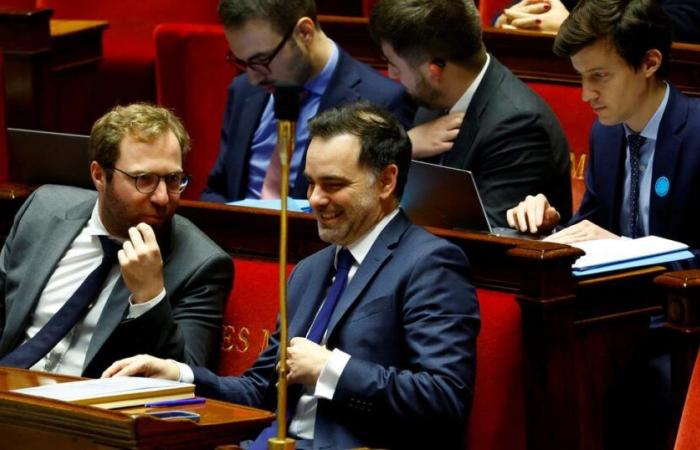In the Assembly, while awaiting the budget, the emergency law presented by the resigning government was adopted despite some tensions.
The debates did not last long. This Monday afternoon, in the Assembly, the deputies overwhelmingly voted in favor of the special bill presented urgently by the resigning government after the censure voted against Michel Barnier. With 481 votes in favor – 0 against and 63 abstentions – the Assembly therefore adopted this text, the primary objective of which is to ensure “the continuity of public services and the life of the country”says the President of the Republic, Emmanuel Macron. After the rejection of the Social Security financing bill and the stagnation of the finance bill for 2025 and while waiting for the new government to put them back on the agenda – probably at the beginning of 2025 -, this law, which will be debated in the Senate on Tuesday, will authorize the state to continue to collect existing taxes and to renew spending at the same level as 2024.
A text «technique» that certain oppositions have not failed to politicize. Particularly after the decision taken by the President of the National Assembly, Yaël Braun-Pivet, to reject the amendments of the Insoumis and RN deputies aimed at indexing the income tax scale to inflation. Following an opinion published by the Council of State in the middle of last week – which judged that this measure was not part of the provisions having their place in special law – the occupant of the Perchoir attracted the wrath of certain deputies. A strategy of “irresponsible chaos”criticized Mathilde Panot, the president of the LFI group, on social networks.
An opinion which does not bring everyone in agreement within the oppositions. “Is it really serious to respect the Constitution when you are president of the National Assembly?”mockingly asks the ecologist Jérémie Iordanoff, vice-president of the institution. Even Éric Coquerel, LFI president of the finance committee, did not wish to argue about this choice when he spoke in the Hemicycle. Especially since the vote on a budget law at the beginning of 2025 will prevent – this is what the deputies who tabled these amendments fear – certain French people who have not been taxed until now from becoming so in 2025. “Like kids stealing a bag of marbles, they tried to get back what they had stolen. They defend purchasing power but they pick their pockets”storms the MoDem deputy Philippe Vigier.
Consensus before the real battle
During the debates, everyone agreed, this emergency law, which responds to “an exceptional and serious situation”says the resigned Minister of the Economy, Antoine Armand, is just a bandage while waiting for two real texts to provide the State with a budget. “This text in no way pre-empts future budgetary discussions. It has only one objective: to ensure, on an exceptional and transitional basis, the continuity of the life of the nation. This special law makes it possible to avoid the shutdown”for his part insisted the Minister of the Budget, Laurent Saint-Martin.
During the discussion, all the oppositions made it known that they would not oppose this law, before returning to the reasons for the censure voted against the Barnier government. “Censorship is not the origin or cause of political instability. It was politically necessary because the National Assembly represents the French people.defended Éric Coquerel (LFI). “There will be no shutdown. France stands tall without you, in spite of you, and against you. Vitale cards will work, civil servants will be paid, pensions will be paid”then stormed the RN deputy Jean-Philippe Tanguy, accusing the presidential camp of having shown alarmism. “Macronism only holds together through the fears and anxieties that you stir up”he also pounded.
While France's rating was downgraded by the American rating agency Moody's, the budgetary debates which will take place at the start of 2025 largely animated the discussions. “The special law has the disadvantage of putting Parliament under terrible pressure”regretted the socialist Philippe Brun, pointing out the risk that France finds itself in “cessation of payments”at the end of March, in the absence of a vote on a finance bill. And calling on the government to “open the dialogue” with the left “to get out of the crisis and rebalance the effort between working French people and large companies”.
For the new Prime Minister, François Bayrou, the consultations initiated in recent days and the composition of his future government will therefore be crucial in view of the budgetary debates to come. In the meantime, by the end of the year, the deputies will be technically unemployed.






